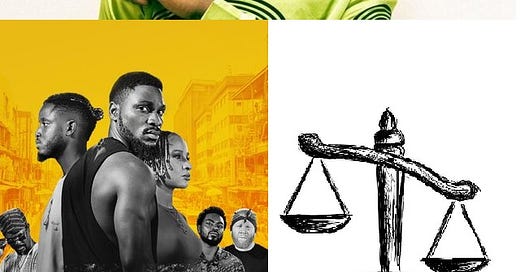On the recent recommendation of a friend, I decided to watch Gangs of Lagos, and like any movie I find myself watching lately, I started by increasing the playback speed by at least 25%. This was my first mistake.
The first scene in Gangs of Lagos—as those who have seen the movie might bear witness—is nothing if not gripping, for its crudeness and uncoated violence. But this was not the first time in recent years that I had seen gang-related violence in a Nigerian movie: I remember, for instance, seeing somewhat similar violence mixed with grief in the first four or five minutes of Blood and Oil (Oloibiri). However, the violence in the opening of the Gangs of Lagos is distinct, mainly because it is wrapped beneath the toga of cultural prestige. This, in my view, is the first compelling element in the film, and in a sense, it felt scandalous to me. At bottom, the scene’s gratifying scandalousness emanates from the fact that it manifests as a violation, even abomination, of the Nigerian—specifically Yoruba—cultural norm and reverence. I had to rewind and watch it properly, leaving the rest of the movie to unfold for two satisfying hours at normal speed.
The Yoruba-revered Eyo, which serves as the fictional vehicle for that malicious assassination, provides us with our first glimpse of the undeniable parallelism between the core message of the Gangs of Lagos and the present-day Nigerian condition. In itself, the Eyo is a symbol of death due, in the main, to its cultural and philosophical affiliation to the afterworld and the dead. However, centering a blatant, intrigue-mired political assassination around the image of Eyo, warts and all, deserves our absolute commendation for its boldness and validity. The Gangs of Lagos would be nothing without everything it reveals about Nigeria and the multiple faces of corrosive power. This Nigeria, our beloved country, is simply a criminal fiefdom that shamelessly luxuriates in its capacity to denigrate and entrap the Nigerian people mentally and materially. We are Nigerians only as much as we are willing victims of Nigeria.
Ilerioluwa Oladimeji Aloba, known more by his stage name MohBad, is the latest well-known victim of this thing we call Nigeria. MohBad’s death is unarguably controversial, fully deserving of the week-long publicity and outrage it has set aflame. It is appropriate to demand justice for MohBad, but the real question is where will the justice come from? We may be yet to establish much, but we know there were multiple actors in the circumstances that preceded the demise of the young celebrity.
The uncastrated, egomaniacal, state-backed bullies who made a living death out of MohBad’s life acted within the yet-to-be-addressed assurances of a perverted environment, a nationwide impetus of decadence that derives its essence from the glorification of criminality, immorality, unabashed thuggery and corrosive power. Everywhere in Nigeria—across every nook and cranny of private, public, social, religious, secular, artistic, cultural and multicultural institutions in Nigeria—life is only as valuable as the capacity of its subject for decadence.
The maliciousness of MohBad’s former record label and traitorous associates is no more condemnable than the vicious inclinations of the southern Nigerian pastor who orchestrated the incarceration of a female social media user for several months between 2017 and 2018. The Nigerian congregants, who cheered that pastor even when he mandated a forced conversion to Christianity from his victim as a prerequisite for her complete freedom from persecution, are no less morally blighted than the Nigerians who gave wings to the essentially criminal nobodies who became MohBad’s malicious antagonists.
Nigerians are perpetually haunted by monsters of their own creation or enablement, and only a radical break from this ubiquitous perversion can give us the slightest chance at reversing this decadence.
If we have learned anything from the Gangs of Lagos, it is this: justice is particularly elusive in Nigeria. There is a long list of people that Nigeria owes justice, and those who have ever come close to achieving justice in Nigeria have done so by pulling themselves up by their own bootstraps.
Raphael Adebayo is an author and human rights activist. His book, De-Nigerianization, is described as ‘a propulsive vignette of Nigeria’s historical lopsidedness’ and an exhortation to confront the meaning of Nigeria.







I believe Tinubu is involved
I strongly believe that Mohbad was killed to cover up the drug cartel run by Azeez Adeshina Fashola one come to think of it no one knows where he is from and to start with who is his father we only know that he moved to London at 11 but who then took care of him